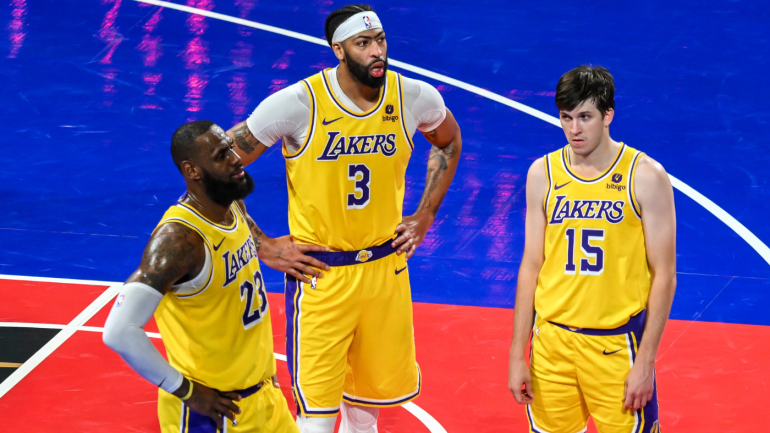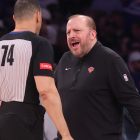
Nearly four months ago, the Los Angeles Lakers won the NBA's inaugural In-Season Tournament. In the 13 games that followed their championship victory over the Indiana Pacers, the Lakers went 3-10. LeBron James linked those struggles to the extra energy they had exert to earn their crown. "Have you seen Indiana's record since Vegas?" James grumbled after a Dec. 18 loss to the New York Knicks.
Now the Lakers find themselves in a rather unique situation. As of this writing, their 42-33 record has them in ninth-place in the Western Conference. Getting up to the No. 8 seed in the next two weeks would be incredibly meaningful. That's the difference between needing to win one Play-In Tournament game or two in order to reach the playoffs. Sitting one spot above them at No. 8 are the 43-31 Sacramento Kings, who are trending down after losing Malik Monk and Kevin Huerter to injuries.
The Lakers have the NBA's seventh-easiest remaining schedule. The Kings have the fourth-hardest. There is a very real chance that the Lakers close that 1.5-game gap in the standings between now and April 14. Of course, just closing that gap would do the Lakers little good. The Kings have the head-to-head tiebreaker.
But here's the rub... technically, it shouldn't even be possible for the Lakers and Kings to tie in the standings. They won't end the season having played the same number of games. The Lakers, having won the In-Season Tournament, will play 83 games between opening night and the end of the regular season. The Kings, like most teams, will play only 82. The Lakers will get no credit for that extra win over the Pacers in the tournament championship, but all of those losses that followed? They all count. In that sense, the In-Season Tournament's winner may also be its biggest loser.
Though not every team carries such a direct grievance, the In-Season Tournament suddenly looms larger than ever thanks to this season's remarkably condensed standings. Virtually every seed save No. 1 in the Eastern Conference is still up for grabs.
- Seeds 2-5 in the East are separated by only 3.5 games.
- Seeds 6-8 in the East are separated by only 2.5 games.
- Seeds 1-3 in the West are separated by one game.
- Seeds 4-6 in the West are separated by by 2.5 games.
- Seeds 7-9 in the West are separated by two games.
Basically nobody outside of Boston is locked into a specific seed yet. Playoff placement is going to come down to a game here, a game there and tiebreakers that may not even be set yet. What does this have to do with the In-Season Tournament? Well, teams weren't issued complete schedules this season. Two blank slots were built into the schedule to account for possible In-Season Tournament outcomes. Teams that advanced to the knockout stage would play their 81st and 82nd (and potentially an uncounted 83rd) games there, but teams that didn't needed two more typical regular-season games scheduled. Opponents for these games were based at least partially on In-Season Tournament performance. Here's how the league explained it before the season:
A formulaic approach will determine the matchups for these games using the Group Play standings in each conference (5th-15th).
Two of the 22 games will be scheduled cross-conference since there will be an odd number of teams in each conference that do not advance to the Quarterfinals. These cross-conference games will be scheduled between bottom-finishing teams in the Group Play stage subject to travel constraints, and no team will play more than one of its two games cross-conference.
The other 20 games will be scheduled within conference featuring teams that are otherwise scheduled to play each other three times over the course of the season wherever possible.
Virtually every area of the standings was affected by these scheduling decisions in some significant way. Take the race for the No. 1 seed out West. Both the Nuggets and Thunder had to face the Houston Rockets in one of these games. Houston won both. The Nuggets drew an extra game against the Clippers (also a loss). The Thunder drew an extra game against the Warriors (a win). But the Timberwolves? They won games against the San Antonio Spurs and Memphis Grizzlies by 32 combined points. Those two teams have barely won more combined games this season (43) than Houston has alone (38) thus far this season.
The losing quarterfinalists were also hit hard here. The Knicks were rewarded for their group stage success with extra matchups against the Boston Celtics and Milwaukee Bucks. They lost both. Right now, they are tied in the loss column for the No. 3 seed in the East with the Cleveland Cavaliers. The Suns drew the Lakers and Kings as their prize for advancing. The Mavericks, whom they've been competing with to avoid the play-in, got the Trail Blazers and Jazz.
Looking for more NBA coverage? John Gonzalez, Bill Reiter, Ashley Nicole Moss and special guests dive deep into the league's biggest storylines daily on the Beyond the Arc podcast.
The NBA's schedule isn't strictly balanced. Some teams play harder slates than others, and for the most part, it lacks the strict, performance-based elements that the NFL includes in its schedule. Yet before the season, Evan Wasch, the NBA's EVP of basketball strategy and analytics and one of the architects of this tournament, said that "Ultimately, we decided that the tournament should stand alone."
That was why the NBA decided not to constrain tournament groups to divisions or award some sort of competitive incentive to winning the tournament like a draft pick. As we're seeing now, though, the tournament hasn't quite stood alone. Its effects are still being felt in April.
That's not an excuse to hit the panic button. The tournament t (which will be called the NBA Cup next season) was, by and large, a big success for the NBA. The league has made it clear that it remains open-minded about tournament formatting decisions moving forward. The tournament we saw in 2023 is probably going to look different from the ones we'll see in 2024 and 2030. This is still a new event that's going to be tinkered with.
There isn't an easy solution here, especially since some of the issues at play here contradict one another. The NBA's desire to make the In-Season Tournament a standalone event is probably the right approach, and the league could conceivably find ways to adjust the schedule so that teams aren't punished for participating in it. But that wouldn't mean much to a Lakers team that will play 83 games and only get credit for 82. This is going to be a multi-year adjustment process that likely won't ever satisfy everyone. But what's happening this season is evidence that some changes are needed here. Every game counts given the parity of the past few seasons.






















